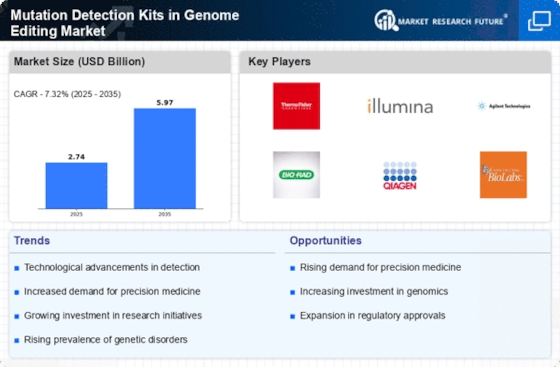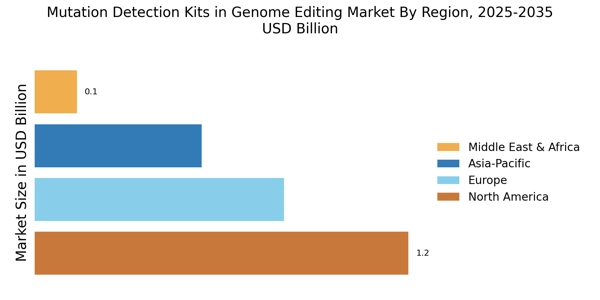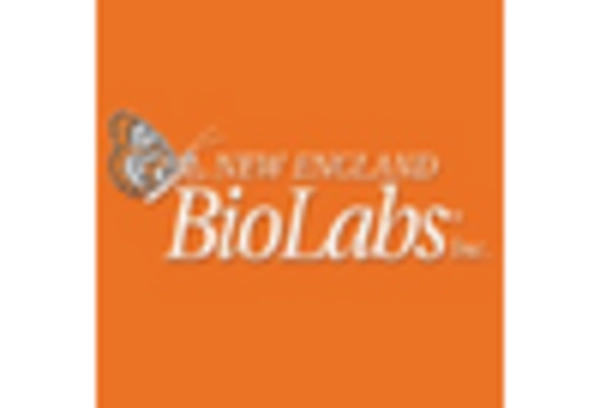Rising Demand for Genetic Testing
The increasing prevalence of genetic disorders and the growing awareness of personalized medicine are driving the demand for mutation detection kits in the genome editing market. As healthcare providers and patients seek more precise diagnostic tools, the market for these kits is expected to expand significantly. According to recent estimates, the mutation detection kits market is projected to reach a valuation of approximately USD 1.5 billion by 2026. This surge is attributed to the need for early detection and intervention in genetic diseases, which underscores the importance of mutation detection kits in genome editing market. Furthermore, advancements in sequencing technologies are enhancing the accuracy and efficiency of these kits, making them indispensable in clinical settings.
Regulatory Support for Genetic Testing
Regulatory bodies are increasingly recognizing the importance of genetic testing, which is positively influencing the mutation detection kits in genome editing market. The establishment of clear guidelines and frameworks for the approval of genetic testing products is fostering a conducive environment for market growth. For example, the Food and Drug Administration (FDA) has streamlined the approval process for certain mutation detection kits, thereby expediting their entry into the market. This regulatory support not only enhances consumer confidence but also encourages manufacturers to innovate and improve their offerings. As a result, the market is expected to experience steady growth, with projections indicating a potential market size of USD 1.8 billion by 2028.
Growing Awareness of Precision Medicine
The increasing emphasis on precision medicine is a significant driver for the mutation detection kits in genome editing market. As healthcare shifts towards more individualized treatment approaches, the need for accurate mutation detection becomes paramount. Patients and healthcare providers are increasingly seeking tailored therapies that are informed by genetic information, which necessitates the use of mutation detection kits. This trend is reflected in the rising number of clinical trials focusing on targeted therapies, which often rely on the identification of specific genetic mutations. Consequently, the market is poised for growth, with estimates suggesting a CAGR of approximately 10% over the next five years, as the demand for precision medicine continues to rise.
Increased Investment in Genomic Research
The surge in funding for genomic research initiatives is a pivotal driver for the mutation detection kits in genome editing market. Governments and private organizations are allocating substantial resources to explore the genetic basis of diseases, which necessitates the use of advanced mutation detection technologies. For instance, the National Institutes of Health (NIH) has significantly increased its budget for genomic research, which is expected to enhance the development and adoption of mutation detection kits. This influx of investment is likely to foster innovation and improve the accessibility of these kits, thereby expanding their application in clinical and research settings. The anticipated growth in research activities is expected to further stimulate the market, potentially leading to a valuation exceeding USD 2 billion by 2027.
Technological Innovations in Genome Editing
Technological advancements in genome editing techniques, such as CRISPR-Cas9, are propelling the mutation detection kits in genome editing market. These innovations facilitate precise modifications at the genetic level, thereby increasing the necessity for reliable detection methods. The integration of next-generation sequencing (NGS) with mutation detection kits has revolutionized the landscape, allowing for high-throughput analysis and comprehensive mutation profiling. As a result, the market is witnessing a compound annual growth rate (CAGR) of around 12% from 2023 to 2028. This growth is indicative of the increasing reliance on sophisticated tools that can accurately identify mutations, which is crucial for both research and therapeutic applications.

















